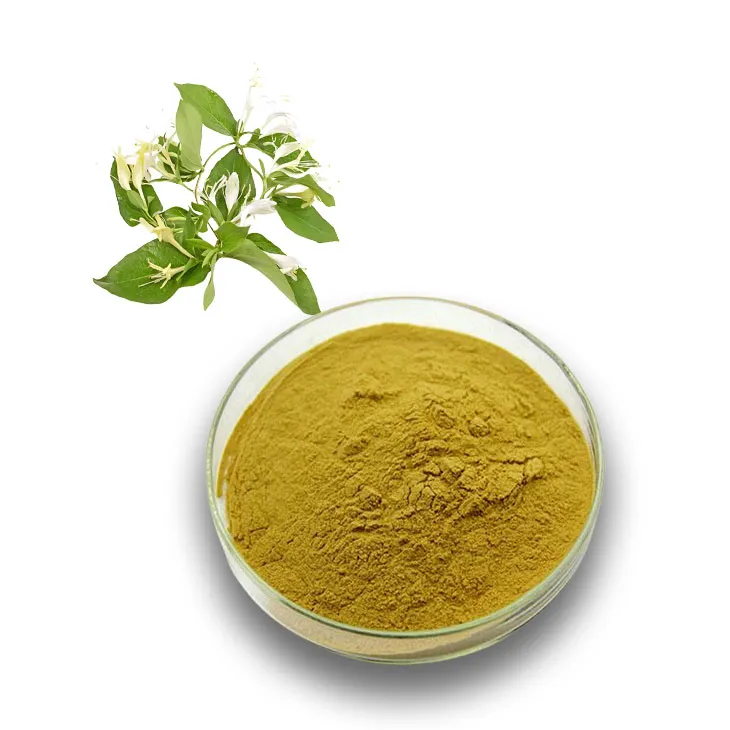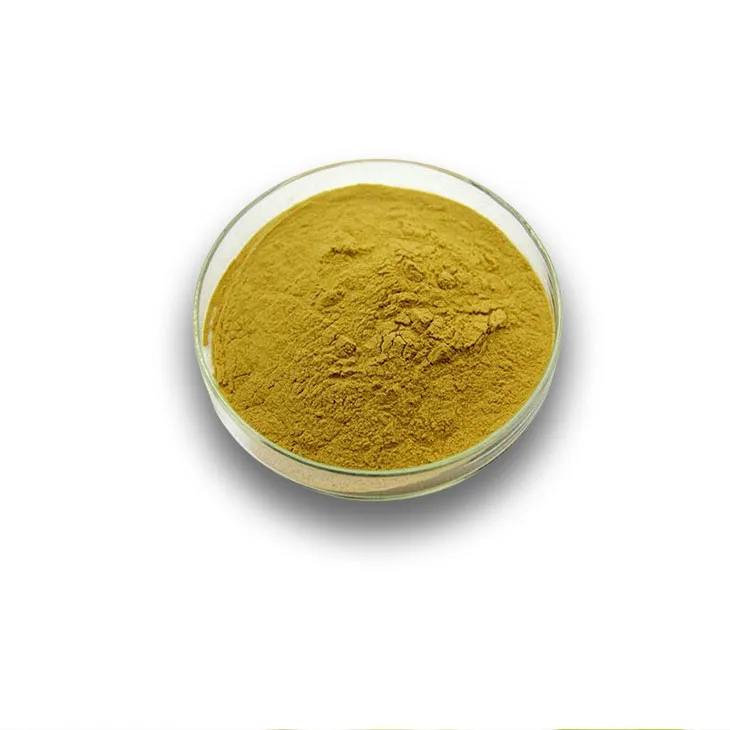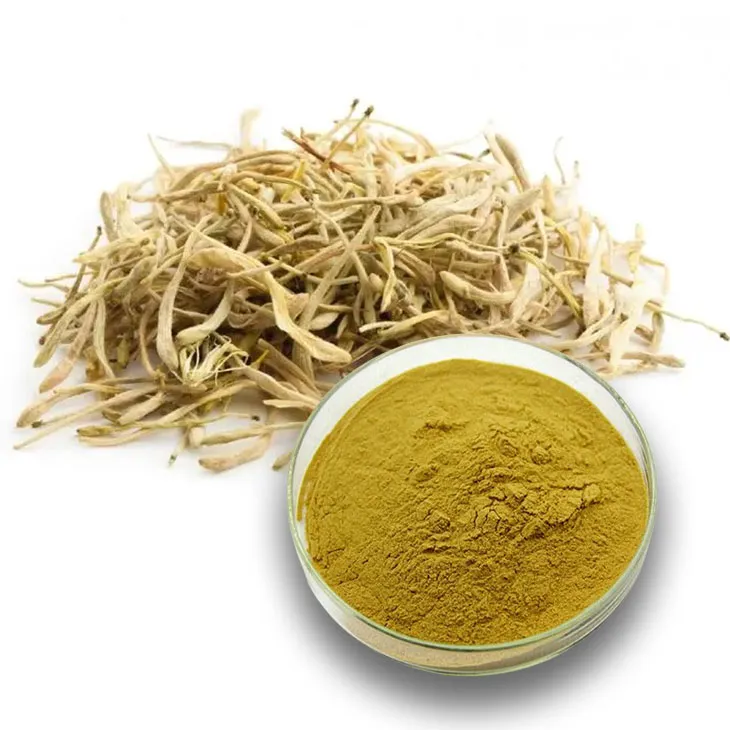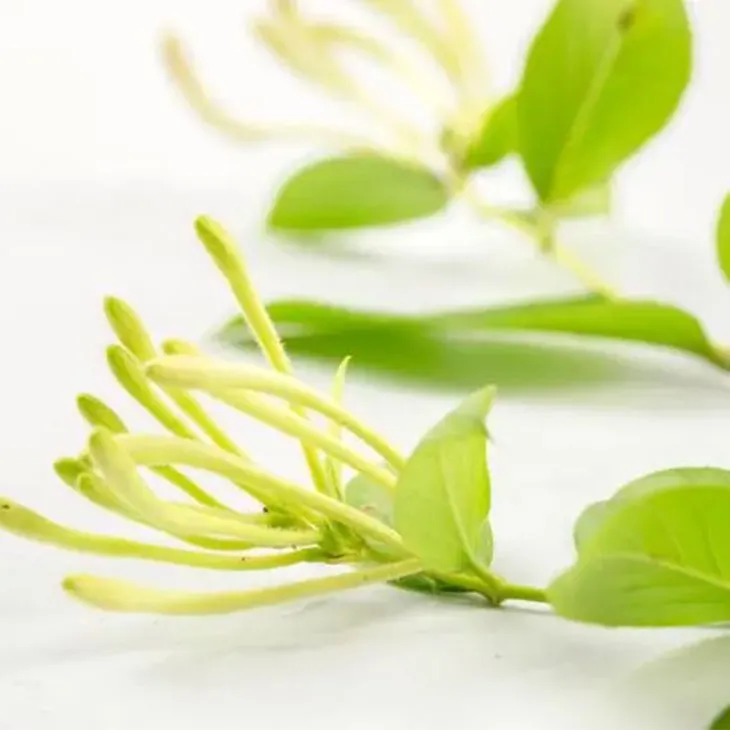- 0086-571-85302990
- sales@greenskybio.com
The Golden Dust of Spring: A Guide to the Commercial Uses of Honeysuckle Pollen
2024-07-03

1. Introduction
Honeysuckle Pollen, often regarded as the golden dust of spring, is a natural substance that is beginning to gain significant attention in the commercial world. This tiny yet powerful component has a plethora of potential uses that span across various industries. As the demand for natural and effective ingredients grows, Honeysuckle Pollen is emerging as a promising resource with great economic potential.

2. Honeysuckle Pollen in the Food and Beverage Industry
2.1 Nutritional Value
Honeysuckle pollen is rich in essential nutrients, making it a valuable addition to food and beverage products. It contains a variety of vitamins such as vitamin C, which is known for its immune - boosting properties, and vitamin E, an antioxidant that helps protect cells from damage. Additionally, it is a source of minerals like potassium, calcium, and magnesium. These nutrients not only contribute to the overall healthfulness of the product but also appeal to consumers who are increasingly conscious about the nutritional content of what they consume.
2.2 Flavor - enhancing Qualities
One of the most appealing aspects of honeysuckle pollen in the food and beverage industry is its unique flavor - enhancing qualities. It imparts a delicate, floral sweetness that can add depth and complexity to a wide range of products. For example, in the production of artisanal honeys, the addition of honeysuckle pollen can create a more nuanced and luxurious flavor profile. In beverages, it can be used in herbal teas, fruit juices, or even craft beers to provide a subtle floral note. This flavor is not overpowering but rather complements other ingredients, making it a versatile and sought - after ingredient for product development.
2.3 Market Trends and Product Examples
There is a growing trend in the food and beverage market towards natural and botanical - based ingredients. Honeysuckle pollen fits perfectly into this trend. Some companies are already using it in their products. For instance, there are specialty jams and jellies that contain honeysuckle pollen, which not only enhance the flavor but also give the product a unique selling point. In the beverage sector, a new line of floral - infused sparkling waters has emerged, with honeysuckle pollen as one of the key ingredients. These products target consumers who are looking for novel and healthy beverage options.
3. Honeysuckle Pollen in the Beauty Industry
3.1 Antioxidant Properties
In the beauty industry, the antioxidant properties of honeysuckle pollen are highly prized. Antioxidants play a crucial role in skincare and haircare as they help to combat free radicals, which are unstable molecules that can cause damage to the skin and hair cells. By neutralizing these free radicals, honeysuckle pollen can help prevent premature aging, such as the formation of wrinkles, fine lines, and dullness of the skin. It also helps in maintaining the health and vitality of the hair by protecting the hair follicles from oxidative stress.
3.2 Nourishing Features
Honeysuckle pollen is also known for its nourishing features. It contains fatty acids, amino acids, and other bioactive compounds that can deeply moisturize and condition the skin and hair. In skincare products, it can improve the skin's texture, making it smoother and more supple. For haircare, it can add shine, strength, and manageability to the hair. These nourishing effects make it a valuable ingredient in a wide range of beauty products, from high - end creams and lotions to more affordable hair masks and conditioners.
3.3 Product Innovations
The beauty industry is constantly evolving, and honeysuckle pollen is being incorporated into innovative products. There are now facial serums that specifically target anti - aging, with honeysuckle pollen as a star ingredient. In haircare, there are shampoos and conditioners that claim to repair damaged hair using the power of honeysuckle pollen. Additionally, some beauty brands are creating all - natural makeup products, such as blushes and highlighters, that incorporate honeysuckle pollen for its antioxidant and skin - enhancing properties.
4. Honeysuckle Pollen in Traditional Medicine - inspired Commercial Products
4.1 Historical Use in Traditional Medicine
Honeysuckle has a long history of use in traditional medicine. In many cultures, it has been used to treat a variety of ailments. For example, in Chinese traditional medicine, honeysuckle is often used to clear heat and detoxify the body. Honeysuckle pollen, being a part of the plant, is believed to inherit some of these medicinal properties. It has been used in traditional remedies for respiratory problems, skin infections, and digestive disorders.
4.2 Modern Commercial Adaptations
In modern commercial products, honeysuckle pollen is being used in a more refined and standardized way. There are herbal supplements on the market that contain honeysuckle pollen, which are marketed for their immune - boosting and detoxifying effects. Some natural health product companies are also developing tinctures and extracts that use honeysuckle pollen as a base ingredient, aiming to provide consumers with a natural alternative to synthetic medications for minor health issues.
4.3 Regulatory Considerations
However, when it comes to traditional medicine - inspired commercial products containing honeysuckle pollen, there are regulatory considerations. Different countries have different regulations regarding the use of herbal ingredients in health products. For example, in the United States, the Food and Drug Administration (FDA) has strict guidelines on the labeling, safety, and efficacy of such products. Manufacturers need to ensure that their products meet these regulations to be legally sold in the market.
5. Future Prospects in Modern Pharmaceutical Research
5.1 Potential Bioactive Compounds
Modern pharmaceutical research is increasingly interested in honeysuckle pollen due to its potential bioactive compounds. Scientists are exploring the possibility that honeysuckle pollen may contain substances that could be developed into new drugs. For example, some preliminary studies have suggested that certain compounds in honeysuckle pollen may have anti - inflammatory properties, which could be useful in the treatment of chronic inflammatory diseases such as arthritis.
5.2 Research Challenges
Despite the potential, there are several research challenges associated with honeysuckle pollen. One of the main challenges is the isolation and identification of the active compounds. Honeysuckle pollen is a complex mixture of various substances, and it requires advanced analytical techniques to separate and study these compounds. Additionally, conducting clinical trials to prove the efficacy and safety of potential drugs derived from honeysuckle pollen is a costly and time - consuming process.
5.3 Future Opportunities
Nevertheless, the future opportunities for honeysuckle pollen in modern pharmaceutical research are promising. With the growing interest in natural products and the increasing need for new drugs, honeysuckle pollen could be a valuable resource. If research can overcome the current challenges, it could lead to the development of novel drugs that are both effective and have fewer side effects compared to some existing medications.6. Conclusion
Honeysuckle pollen, the golden dust of spring, has shown great potential in various commercial uses. In the food and beverage industry, it offers both nutritional value and flavor - enhancing qualities. In the beauty industry, its antioxidant and nourishing features make it a desirable ingredient. In traditional medicine - inspired products, it has a historical basis for use, and in modern pharmaceutical research, it holds future prospects. However, as with any natural ingredient, there are challenges to overcome, such as regulatory compliance and research difficulties. Overall, with continued research and development, honeysuckle pollen could become an even more important and widely - used commercial resource in the future.
FAQ:
What are the nutritional contents of honeysuckle pollen?
Honeysuckle pollen contains a variety of nutrients such as proteins, vitamins, and minerals. Proteins are essential for building and repairing tissues in the body. Vitamins like vitamin C and some of the B - vitamins contribute to overall health and well - being. Minerals like potassium and magnesium play important roles in various physiological processes.
How does honeysuckle pollen enhance the flavor in food and beverage?
Honeysuckle pollen has a unique, sweet and slightly floral flavor. In food and beverage, it can add a delicate and natural sweetness. For example, in some desserts, it can blend with other flavors like fruits and creams, creating a more complex and appealing taste. In beverages, it can enhance the overall aroma and taste profile, giving a fresh and pleasant drinking experience.
What are the antioxidant benefits of honeysuckle pollen in skincare?
The antioxidant properties of honeysuckle pollen help in skincare by neutralizing free radicals. Free radicals are unstable molecules that can damage skin cells, leading to premature aging, wrinkles, and dull skin. By combating these free radicals, honeysuckle pollen can help maintain the skin's elasticity, reduce the appearance of fine lines, and keep the skin looking youthful and radiant.
How is honeysuckle pollen used in haircare products?
In haircare products, honeysuckle pollen can nourish the hair follicles. It provides essential nutrients that can strengthen the hair from the roots. It may also improve the hair's texture, making it smoother and shinier. Additionally, it can help in reducing hair breakage and promoting healthy hair growth.
What role does honeysuckle pollen play in traditional medicine - inspired commercial products?
In traditional medicine - inspired commercial products, honeysuckle pollen has been used for its various properties. It may be used for its anti - inflammatory properties to soothe skin irritations or internal inflammations. It has also been associated with immune - boosting effects, which can be beneficial in products designed to support the body's natural defenses.
Related literature
- The Potential of Honeysuckle Pollen in Modern Nutrition"
- "Honeysuckle Pollen: A New Ingredient in Cosmetics"
- "Traditional and Modern Uses of Honeysuckle Pollen in Medicine"
- ▶ Hesperidin
- ▶ citrus bioflavonoids
- ▶ plant extract
- ▶ lycopene
- ▶ Diosmin
- ▶ Grape seed extract
- ▶ Sea buckthorn Juice Powder
- ▶ Beetroot powder
- ▶ Hops Extract
- ▶ Artichoke Extract
- ▶ Reishi mushroom extract
- ▶ Astaxanthin
- ▶ Green Tea Extract
- ▶ Curcumin Extract
- ▶ Horse Chestnut Extract
- ▶ Other Problems
- ▶ Boswellia Serrata Extract
- ▶ Resveratrol Extract
- ▶ Marigold Extract
- ▶ Grape Leaf Extract
- ▶ blog3
- ▶ Aminolevulinic acid
- ▶ Cranberry Extract
- ▶ Red Yeast Rice
- ▶ Red Wine Extract
-
Echinacea Extract
2024-07-03
-
Maca Extract
2024-07-03
-
Quercetin
2024-07-03
-
Avocado Extract Powder
2024-07-03
-
Polygonum Cuspidatum Extract
2024-07-03
-
Konjac Powder
2024-07-03
-
White mustard seed extract
2024-07-03
-
Black Rice Extract
2024-07-03
-
Grape Seed Extract
2024-07-03
-
Peppermint Extract Powder
2024-07-03





















